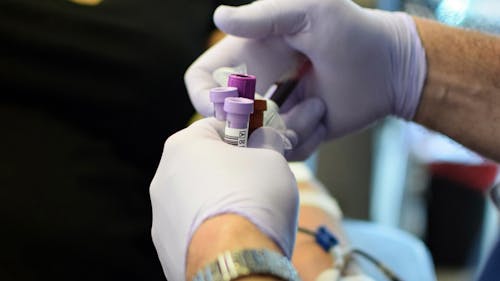Rutgers Blood Initiative works to reduce blood supply shortages during pandemic

Students have been working to reduce local blood bank shortages and raise awareness about the impacts of donating blood in the coronavirus disease (COVID-19) pandemic through the Rutgers Blood Initiative, a chapter of the University Blood Initiative.
The chapter began last semester with Rutgers School of Arts and Sciences sophomore Mitsu Patel, who originally worked as a responder for the University Blood Initiative’s COVID Code Red campaign, an awareness initiative started in response to more than 45,000 blood drives getting cancelled during the pandemic.
She said this experience along with her volunteer work at the Robert Wood Johnson University Hospital blood bank inspired her to create the Rutgers Blood Initiative, serving as co-president.
“We take the energy of our youth and transform it into tangible efforts that benefit the community in terms of blood shortages, especially during times like this,” Patel said.
Over the past six months, the Rutgers Blood Initiative has hosted five of its own blood and platelet drives with the RWJBarnabas blood center as part of its efforts to create an efficient and sustainable local blood supply system through cooperation with partner organizations, she said.
Recently the organization has partnered with the Miller-Keystone Blood Center to promote COVID-19 convalescent plasma donations as part of the University Blood Initiative’s Push 4 Plasma campaign, she said. Convalescent plasma refers to a blood component from individuals who have developed antibodies against a disease that can help others fight it.
As an organization created amid a pandemic, the Rutgers Blood Initiative initially had trouble getting on its feet, Patel said. Public skepticism about the safety of blood donations made it difficult for the group to find physical spaces to hold blood drives and motivate donors to come.
Nonetheless, she said, the organization has sustained itself through working with online platforms and social distancing regulations to continue its mission of facilitating blood donations.
Akshat Goswami, a School of Arts and Sciences sophomore and co-president of the Rutgers Blood Initiative, said he joined the organization to help educate people on the scarcity of blood supply during the pandemic, which can help frontline workers get the needed donations.
“My favorites memories have been when I have donated blood and platelets myself,” he said. “It is such an amazing experience and I wish to do it more often all because of the Rutgers Blood Initiative.”
Maryum Khan, a School of Arts and Sciences sophomore and the organization’s chair of campus outreach, said she wanted to join the organization not just to teach people and herself about the blood shortage in the U.S. but to also learn what she could do about it.
“I decided to pursue being the chair of campus outreach so that I can form and maintain connections within and outside of the Rutgers community to aid in the education of others, to have people donate more blood and to ultimately save more lives,” she said. “For example, did you know that (one) donation can save up to (three) lives? Talk about making a positive impact.”
Looking to the future, Patel said that the Rutgers Blood Initiative has new programs in mind which include hosting guest speakers and ramping up awareness campaigns. Currently, the organization is electing executive board members for next school year.
Patel said she is proud of the work that the Rutgers Blood Initiative has done, despite facing numerous hurdles during the pandemic.
“Even though we were not able to get our target number of donors at times, we believe that every single donor counts especially in these adverse conditions the healthcare field is facing,” she said.



